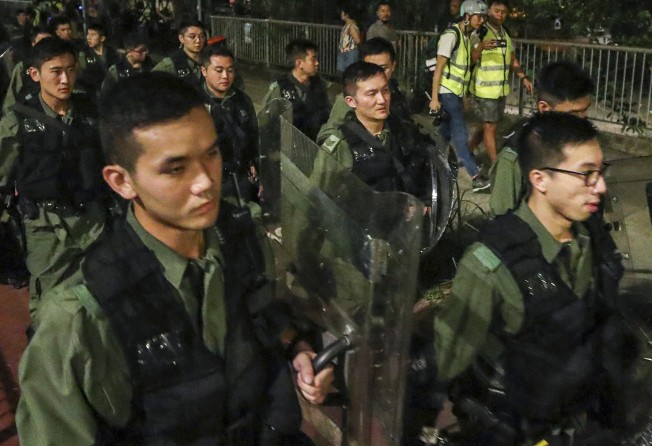Organiser vows to push ahead with Yuen Long march after Hong Kong police refuse permission, citing safety concerns
- Force took advice from rural leaders, but organiser says this only fuels suspicions that officers are colluding with them
- Northern town has become flashpoint in latest escalation of conflict from extradition bill crisis

The organiser of a potentially chaotic protest march planned for Saturday in Hong Kong’s northern town of Yuen Long has vowed to push on even though it would be an illegal assembly after police banned the gathering, citing a serious risk of violence.
In a rare move, police on Thursday issued a letter of objection to the march, saying it was to ensure public order and safety, and to protect the rights and freedoms of others who would be affected, even as the organiser and scores of defiant citizens promised to go ahead regardless of the legal consequences.
“The march is triggered by the violent incidents last Sunday and protesters have showed hostility towards some Yuen Long residents,” acting New Territories North regional commander Anthony Tsang Ching-fo said on Thursday. “There is a fairly high chance for both sides to clash.”
The planned march to Yuen Long’s MTR station to condemn a mob who went on a shocking rampage there on Sunday night, and to criticise the government and police for failing to protect the victims, has raised fears of more violence because of calls for retaliation against nearby villages where the attackers were believed to have come from.
At least 45 people were injured when more than 100 men in white T-shirts, including suspected triad gangsters, attacked anyone in their path with sticks and iron rods. They were targeting people wearing black – the colour of the protest movement against the government’s now-suspended extradition bill – but beat up train passengers, passers-by and journalists at the scene, with no police around to stop them.
Reflecting tensions in the primarily rural district, Tsang said the march would end near several villages, and police had reason to believe clashes would erupt between protesters and villagers.
We won’t make trouble, but we won’t walk away from trouble
Nam Pin Wai village in particular was where most of the white-clad men were seen gathering that night, and believed to be the home of some of the attackers.
Tsang stressed that allowing the march would have meant ignoring public appeals, after community leaders, university presidents and more than 1,000 citizens raised concerns about the possibility of chaos.
Authorities are worried that Yuen Long town will not be able to accommodate masses of protesters running loose on the streets, which are criss-crossed with tracks for northern Hong Kong’s light rail transit system.
While police warned that anyone joining the march would be breaking the law, they promised to deploy extra manpower to manage crowd control, ensure public safety and handle transport disruptions.
Protest organiser Max Chung Kin-ping vowed to defy the ban, which he described as a “political move” that would provoke an even larger turnout.
The rejection would only fuel anger over the perception that police were “colluding” with rural powers, Chung said.
Tsang denied acting out of fear of rural leaders who have a dominant power base in the district.
Kenneth Lau Ip-keung, head of the powerful Heung Yee Kuk rural body, said he was glad police had turned down the march application.
He urged both protesters and villagers to remain calm, and advised local residents to stay at home if possible to avoid any trouble. He also called for police to increase their presence for the sake of law and order.
Ching Chan-ming, chairman of the Shap Pat Heung Rural Committee, warned protesters not to make good on threats to storm villages and damage ancestral halls.
“We won’t make trouble, but we won’t walk away from trouble,” he said, warning that many villagers had agricultural tools at home to defend themselves. “If they are provoked, villagers will protect their homes.”
Meanwhile those who support the march have been brainstorming online for creative ways to circumvent the police ban.
One idea was to hold a “memorial” for former Chinese Premier Li Peng, despised by many in Hong Kong for his leading role in the Tiananmen Square crackdown, after his death this week.
They noted the Public Order Ordinance stated that regulation of public meetings did not apply to gatherings exclusively “for the purpose of a funeral”, or purposes of religious or cultural discussion.
Barrister Billy Li On-yin, convenor of the Progressive Lawyers’ Group, accused police of stripping Hongkongers of their right to peaceful protest.
“They could have imposed certain conditions to prevent the marchers from going close to the villages,” he said.
At the press conference to announce the ban, Tsang also admitted there might be “room for improvement” in light of police turning up too late to protect the victims of Sunday’s attacks, but he refused to apologise.
“We understand there was a bit of a gap between our operation ... and the expectations of the public,” he said. “We are deeply saddened at not being able to prevent the incident and the injuries suffered by members of the public.”
Additional reporting by Kimmy Chung and Sum Lok-kei